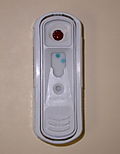 Blue Kitty is a "stray". He's been living at the same place for months, and they like him, and they feed him, but… he's pretty independent. Not the kind of cat that wants to come in and sit on your lap. Really, he's about half wild. Under those circumstances, he doesn't exactly get a thorough physical exam every day. In the last couple of days, they noticed that he just wasn't himself, just eating a little bit. That's why they scooped him into the carrier and brought him in.
Blue Kitty is a "stray". He's been living at the same place for months, and they like him, and they feed him, but… he's pretty independent. Not the kind of cat that wants to come in and sit on your lap. Really, he's about half wild. Under those circumstances, he doesn't exactly get a thorough physical exam every day. In the last couple of days, they noticed that he just wasn't himself, just eating a little bit. That's why they scooped him into the carrier and brought him in.
 Really, he's more than half wild. His goofy expression here is due to the fact that he had to be sedated to handle him, much less do any kind of real examination. He's messed up on dope. He's messed up on a bunch of other stuff, too. He's pretty thin, about 20% underweight (which is a lot) and about 5% dehydrated. He's been feeling bad for more than just two days; at least, he's been in ADR mode ["Ain't Doin' Right"] for longer than that.
Really, he's more than half wild. His goofy expression here is due to the fact that he had to be sedated to handle him, much less do any kind of real examination. He's messed up on dope. He's messed up on a bunch of other stuff, too. He's pretty thin, about 20% underweight (which is a lot) and about 5% dehydrated. He's been feeling bad for more than just two days; at least, he's been in ADR mode ["Ain't Doin' Right"] for longer than that.
 He really stinks, too, and this mouth is why. Not only is there a lot of tartar, his gums are oozing pus and blood around almost every tooth. When you see a cat with such terrible gum disease and some major ADR, you have to wonder if this guy has a normal body defense system. I mean, there HAS to be a reason when somebody looks like this. This is beyond mere dental hygiene problems.
He really stinks, too, and this mouth is why. Not only is there a lot of tartar, his gums are oozing pus and blood around almost every tooth. When you see a cat with such terrible gum disease and some major ADR, you have to wonder if this guy has a normal body defense system. I mean, there HAS to be a reason when somebody looks like this. This is beyond mere dental hygiene problems.
 And here you have his little SNAP test. The blue spot on top is the positive "control" that lets you know the test is working properly, and the blue spot on the right is the one that lets you know Blue Kitty's blood is full of Feline Leukemia Virus. Few cats get the actual leukemia that gives the virus its name. Most just have their immune system shot to hell, like a person with HIV and AIDS. Then they sort of waste away, or start to have a lot of weird infections that shouldn't really be bothering them, like Blue Kitty's mouth problem.
And here you have his little SNAP test. The blue spot on top is the positive "control" that lets you know the test is working properly, and the blue spot on the right is the one that lets you know Blue Kitty's blood is full of Feline Leukemia Virus. Few cats get the actual leukemia that gives the virus its name. Most just have their immune system shot to hell, like a person with HIV and AIDS. Then they sort of waste away, or start to have a lot of weird infections that shouldn't really be bothering them, like Blue Kitty's mouth problem.
Prognosis: poor. That's why you run this test before you advise the client to jump in with both feet, guns blazing and checkbook open wide. They need to know that you may be able to help the cat, but he's not going to get "well". Tough break for the cat who wound up in a high-risk lifestyle.


For cats not infected with FLV or FIV, what might be some modifiable risk factors for dental disease?
I am wondering why some of my cats get more advanced dental disease faster than others, when they are all otherwise healthy and all eat the same dry food.
That is a really good question. Obviously there are individual variations. I see pets with no home care and great teeth at 10 years of age, and others with crappy teeth by the time they are two.
The question (your question as it turns out) is what ARE those individual varations?
Thanks for writing, and it’s off to the dental gurus.
Yeah..Don’t forget your dog’s teeth! Dog dental care is a very important aspect of keeping our dog healthy.
Poor little kitty… I wish there where more like you that do things like this. So is there any chance that the cat could get well? I mean, there are tooth infections and leukemia. Is there any chance for the cat?
-heather-
Hello, Heather,
Cat’s with Feline Leukemia Virus are people with HIV. The disease is poorly named, as very few cats actually develop leukemia. Most suffer from immunosuppression, which results in a variety of conditions.
We are not able to cure the disease, which is why I feel that it is important to vaccinate and prevent it. Many cats who carry the virus can be maintained for a long time, but it is unlikely that they will be able to live a normal lifespan.
The periodontal disease requires more frequent and aggressive management as the underlying cause is a failure of the immune system.
So, the answer is that the kitty can be managed, but not cured.
Thanks for reading and writing.
Hi I’m here again thank you for the reply, Its been a month when i last viewed your site, Honestly, I didn’t expect that you will reply on my question but you did. I wanna thank you for that. I learned something new here, thank you for this valuable information you’ve share on me. Hope you will post more articles and for sure I will be one of your avid fan of your articles. Thanks.
-heather-
Many people do no realize the importance of their pet’s dental health in relation to overall health. Gum disease is associated with decreased immune system and related to a host of other health issues.
-Daniel
what happen with this cat!!Feline Leukemia Virus and Dental Problem
He improved temporarily with antibiotic therapy, but his underlying disease killed him within a few months.
i hope that cat’s had a good life. kind of.
🙁
what a terrible animal disease ?, pour cat…
Is the cat still alive? I hope he’s back to his healthy body.
Sorry to report that he is no longer with us. He succumbed to other medical problems.
I hope the cat is now recovering. 🙁
Feline leukemia is a cancerous disease. And its really very important to take good care of this disease.
I have a cat with feline leukemia that was diagnosed in 2009 when we discovered horrible dental disease (he was approximately a year and a half old; adopted from the SPCA so just an estimate). The vet removed all but five teeth and we’ve managed his up’s and down’s (mostly infections related to the remaining teeth) with antibiotics. He’s since had another canine removed and the vet feels his best chance is to remove the remaining teeth. However, he’s very wiped out by a current round of antibiotics so I’m wondering if his disease could be progressing to something else? What are your thoughts?
Hello, Liz,
Feline Leukemia virus acts much like HIV in people. It damages the body’s ability to fight disease, and damages its ability to heal.
It is usually progressive. Keeping your buddy going for six years is pretty impressive. Most infected individuals don’t make it that long.
Even if I were seeing your cat, I’m not sure I would have any words of wisdom to offer. Since I’m not seeing him, I recommend that you ask your veterinarian the questions that are in your mind.
So often we think that we have communicated so well, and the owner isn’t asking questions because they don’t have any. Then they go looking for “doctor google”.
There’s nothing wrong with researching on the internet. Just give the doctor who is seeing your pet a chance to answer your questions.